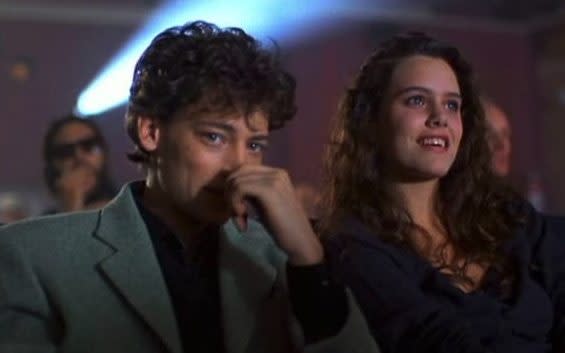Yes, Martin Amis’s masterpiece was misogynistic – that was why it mattered

The Rachel Papers turns 50 this year. That makes it both half a century of the late Martin Amis’s towering presence in British letters, but also half a century of critics and writers wondering aloud: “What’s his issue with women?” Amis’s debut novel was published well before discourse about the “male gaze” went mainstream, but the novelist, who died at the weekend aged 73, was always ahead of his time.
Looking back, a 1970s reader might have been surprised at the subsequent durability of this book, which is about the literary and sexual ambitions of a young man at the end of adolescence. Charles Highway is only hours away from turning 20, but he’s already jaded and world-weary: he has approached life backwards, intellectualising it through books before ever experiencing it. He knows all about families (he references Larkin), he knows all about love (he quotes Tennyson), and he isn’t living his life so much as documenting it in anticipation of a literary career. Until, of course, he falls for Rachel at a party, and resolves to win her over.
Amis’s novel was spry enough to match the mode of many decades of readers. In the 1980s, it re-emerged in the form of an awkward, but not charmless, sex-comedy film, starring Dexter Fletcher, complete with James Spader as the romantic rival. Today, it fits into the never-ending culture wars, as people fret about the disappearance of Amis’s kind, the horny young straight male writer, as if they were as rare and endangered as the Visayan spotted deer. (“Couldn’t publish something like this today!” remains just about the dullest thing one can possibly say about a book.)
I came to Amis’s novel in its 1990s printing, by which time Ethan Hawke movies had convinced plenty of young men that having degrees in philosophy or literature but no real employment made them sexually desirable. A man on whom I had a crush gave me his copy of the Vintage edition with the red-and-black cover, its spine cracked from overuse.
When he found out I was living in a town without a bookshop, he shipped me packages of reading material: Vertigo comics, Douglas Coupland novels, and yes, The Rachel Papers. No wonder the novel did so well with bookish men: this sounds like a seduction technique of its protagonist Charles, if Charles thought women were capable of edification. (Before you feel too bad for me, know that I went on to cheat on this man with someone who had been to Burning Man several times.)

All this should have primed me to dislike, to take offense at, The Rachel Papers – but I mostly thought it was witty, and breezy, and vastly superior to the other book in that box, Coupland’s dreary Girlfriend in a Coma. Now, in the wake of Amis’s death, I’m struck by the way it captures so perfectly a milieu of aspiring writers whose ability keeps toppling over on account of the weight of their ambition; that resentment and pride that burns inside someone misunderstood and underestimated; their embarrassment at being so privileged, and their longing for a little atrocity or hardship so they can begin their true hero’s journey.
If The Rachel Papers later dipped in visibility and reputation, it’s only because it was so influential. It’s not really Amis’s fault that the novel’s basic structure – charismatically cerebral but insecure guy with questionable notions about gender meets girl out of his league; guy pursues girl and wins her over; guy fumbles girl and learns lessons about love and life and women – would be crystallised, one generation later, into a monetisable formula by the likes of Cameron Crowe, Nick Hornby, and their lad-lit peers. The men who followed Amis didn’t want to kill their fathers: they wanted to be just like them, but richer. So, even if you haven’t read The Rachel Papers, you have encountered it – these days, you’ve probably heard too much about the “problematic” nature of such stories as they relate to contemporary heterosexuality.
True, it’s hard to miss the awful way in which Charles Highway describes the women he’s interested in having sex with (or the even worse way he describes those he isn’t). His (male) gaze lingers, horrified, on the excess of the undesirable female body, such as a woman with multiple “chins settled on her throat”, or the many sagging bosoms, or the bouncing (but not in a good way) buttocks. His mother is “a heap”; his supervisor at school is “unpleasant to look at. I won’t go into it.”

But this is the casual misogyny of a young man who needs to think of himself as superior if he wants to outrun his self-hatred and hide his squirming vulnerability. For Amis is just as harsh on men – on the various dull-witted and perennially intoxicated men he portrays in a state of moral and physical decay.
He’s certainly unsparing with this protagonist. Charles is proud of his sexual conquests, despite rarely seeming to have a good time himself, let alone the women. “Gloria has another… five? orgasms” is one such cutting sexual report. Poor Gloria.
This is what Amis’s imitators and critics alike have always seemed to miss, despite it being obvious even in this debut novel: what was on the page was not the product of hate, but simply an ability to see too well. And no one likes to be seen, least of all stark naked with all the lights on. Whatever bravado or arrogance Amis carried was much like Charles’s. It’s the kind that tries to protect the profound sensitivity underneath.

 Yahoo Sports
Yahoo Sports 